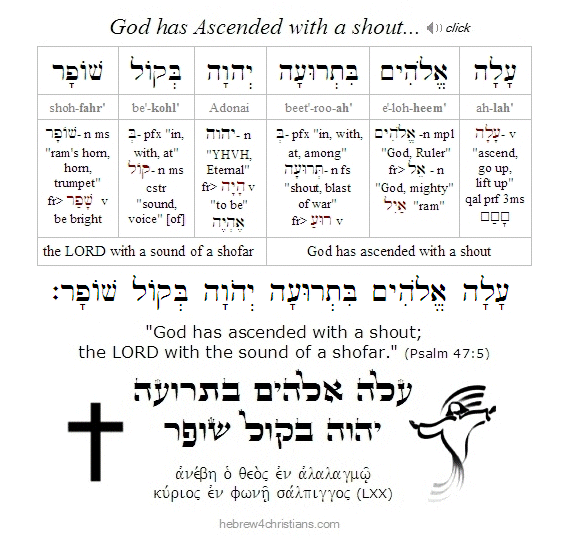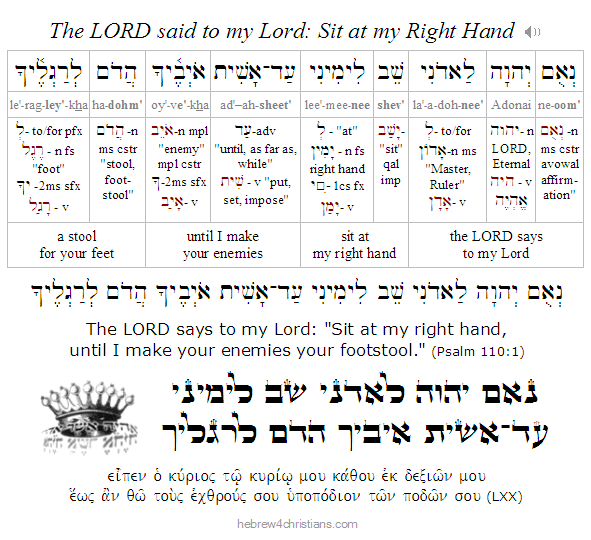|
Forty days after his resurrection, on Mem B'Omer (see Acts 1:3), Yeshua met with his disciples at the Mount of Olives (i.e., Ч”Ц·ЧЁ Ч”Ц·Ч–ЦµЦјЧ™ЧЄЦґЧ™Чќ) near Jerusalem, where he told them they would receive the promised Holy Spirit at the appointed jubilee of Shavuot (i.e., "Pentecost"). Upon his departure he blessed them, and Yeshua began to "ascend" bodily into heaven, thus signifying the close of his ministry on earth ("God with us") in anticipation of the advent of the Holy Spirit ("God in us"). [Note that in the New Testament, the account of the ascension of Yeshua is found in Luke 24:50-51 and Acts 1:3-11)].
The ascension of the Messiah fulfills prophecy as the glory of Yeshua enthroned at the right hand of the Father (Psalm 110:1; Matt. 22:41-46; 26:64), and therefore it marks the transition from his earthy ministry back to his heavenly one, and this is important because it annulled any further claim that Yeshua would physically visit people on earth until the parousia, or the second coming (note that Apostle Paul had encountered Yeshua after the ascension via visions, and not true physical contact in the earthly realm (see Acts 9:1-19; Gal. 1:11-2:1; 1 Cor. 15:8). The ascension signified the ultimate triumph of Yeshua as the "Son of Man" when he physically entered into the heavenly realm. It was not merely the spirit of Messiah that ascended to glory, but redeemed humanity that he represented in his resurrected body. The ascension eternally vindicates and enthrones the salvation of God in Yeshua.
But why 40 days? And what was Yeshua doing during this time? Frankly we don't know the details, though "40 days and nights" represents a period of completeness in the Scriptures. For instance, the cataclysmic judgment during the time of the great flood (Gen. 7:1), the embalming of Jacob (i.e., Israel) in Egypt (Gen. 50:3), the two occasions Moses ascended Sinai to receive the Torah (Exod. 24:18; Exod. 34:28), the intercession Moses made on behalf of Israel (Deut. 9:25); the mission of the spies who searched out the land (Num. 14:34), and Yeshua's tempation in the desert before he began his public ministry (Matt. 4:2; Mark 1:13) as well as his post-resurrection appearances (Acts 1:3) - all were 40 days in duration.
What is spiritually vital about all this, however, is that our Lord, the "Final Adam" (бїѕОџ бј”ПѓП‡О±П„ОїП‚ бѕЅО‘ОґбЅ°Ој, 1 Cor. 15:45) is now seated at the right hand of God (Psalm 110:1), forever enthroned as the Savior and LORD over all, the King of Glory (ЧћЦ¶ЧњЦ¶ЧљЦ° Ч”Ц·Ч›ЦјЦёЧ‘Ч•Ц№Ч“) who has successfully completed his great mission to save humanity from the curse of death because of the original transgression in the garden (Rom. 5:12-21; 1 Cor. 15:21-22).
It was prophesied of our Lord Yeshua in Psalm 68:19 - "You have ascended to the highest (ЧўЦёЧњЦґЧ™ЧЄЦё ЧњЦ·ЧћЦјЦёЧЁЧ•Ц№Чќ); You have taken captives out of captivity (Ч©ЧЃЦёЧ‘ЦґЧ™ЧЄЦё Ч©ЦјЧЃЦ¶Ч‘ЦґЧ™); You have acquired gifts for men (ЧњЦёЧ§Ц·Ч—Ц°ЧЄЦјЦё ЧћЦ·ЧЄЦјЦёЧ Ч•Ц№ЧЄ Ч‘ЦјЦёЧђЦёЧ“ЦёЧќ), yea, even for the rebellious (Ч•Ц°ЧђЦ·ЧЈ ЧЎЧ•Ц№ЧЁЦ°ЧЁЦґЧ™Чќ), that the LORD God may dwell among them (ЧњЦґЧ©ЧЃЦ°Ч›ЦјЦ№Чџ Ч™ЦёЧ”Цј ЧђЦ±ЧњЦ№Ч”ЦґЧ™Чќ). The apostle Paul later quoted this verse and applied it to the victory of Yeshua at the cross, explaining that He had first descended at his death and burial but later ascended far above all (Eph. 4:8-10; Col. 2:15). By delivering captive sinners from their captivity to Satan, the LORD bestowed gifts of the Spirit and eternal life to all who believe. Praise his name forever!
About Mem B'Omer...
We are in the midst of the 49 day "countdown" that runs from the day following the Passover until the day before the holiday of Shavuot ("Weeks" or "Pentecost"). This seven week period is called "Counting the Omer" (ЧЎЧ¤Ч™ЧЁЧЄ Ч”ЧўЧ•ЧћЧЁ) in Jewish tradition (Lev. 23:15-16). During the Temple period, on each of these days an appointed priest would wave a sheaf (omer) of barley before the LORD as a symbolic gesture of dedicating the coming harvest to Him. This ceremony was called tenufat ha-omer ("waving of the sheaf"). On the 50th day, however, a sample of the first crop of the wheat harvest was baked into two loaves of leavened bread (called "Shtei Ha-Lechem," Ч©ЧЃЧЄЧ™ Ч”ЧњЧ—Чќ) and waved before the altar as the climactic rite of the season (Lev. 23:15-20). Notice that this was the only time that otherwise forbidden leaven was used by the priests for the avodah (see Lev. 2:11).
Hebrew Lesson:
Deut. 16:9-10 reading (click):
The 49 days between Passover and Shavuot forms a "chain" that links the two festivals together, and indeed Shavuot is regarded as the culmination of the experience of redemption, sometimes called Atzaret Pesach (ЧўЧ¦ЧЁЧЄ Ч¤ЧЎЧ—), or the "Conclusion of Passover." Just as the redemption by the blood of the lamb led to Israel's deliverance and the giving of the Torah at Sinai, so the redemption by the blood of Yeshua led to the world's deliverance and the giving of the Holy Spirit at Zion... And just as the covenant at Sinai created the nation of Israel, so the covenant at Zion created the worldwide people of God, redeemed from "every tribe and tongue" (Rev. 5:9). The waving of the "two loaves" of leavened bread therefore prophesied the creation of the "one new man," both Jew and Gentile, that would "firstfruits" of the Kingdom of God. In the Sovereign plan of God Almighty, ultimately there would be one flock, and one Shepherd for all God's children (John 10:16).
 |
Since the resurrection of Yeshua occurred during the first day of the omer (i.e., on Yom HaBikkurm), and the Holy Spirit was given to the disciples 50 days later on Shavuot (Pentecost), all of Yeshua's post-resurrection appearances occurred during the days of the Omer count. Some of these appearances were as follows: On the first day of the Omer, Yeshua appeared to Mary Magdalene (Mark 16:9; John 20:16-18), some other women (Matt. 28:5-10), and then to Simon Peter (Luke 24:34; 1 Cor. 15:5). On the second day, He appeared to the two on the Road to Emmaus (Luke 24:13-32) and later that evening to the twelve disciples (Mark 16:14; Luke 24:33-39; John 20:19). A week later, He appeared to the Twelve again (John 20:26) and eight days later appeared to Thomas (John 20:24-29). Some time later, He appeared the third time to the disciples as they went back to their fishing jobs (John 21:1-14). Sometime later Yeshua appeared to 500 (1 Cor. 15:6) and then to James, the half-brother of our Lord Yeshua (1 Cor. 15:7). On Iyyar 25, or the 40th day of the Omer (called Mem B'Omer: Чћ"Чќ Ч‘ЧўЧ•ЧћЧЁ), Yeshua ascended into heaven from Bethany and commanded His followers not to leave Jerusalem until the promise of the Father was fulfilled during Shavuot (Luke 24:44-53; Acts 1:9-11; Eph. 4:8).

The ascension of Yeshua (ЧўЧњЧ™Ч™ЧЄ Ч™Ч©Ч•Чў) was foreshadowed by Moses and the receiving of the Torah at Sinai: Just as Moses had waited 40 days before the Torah was given to Israel, so the disciples waited 40 days before the promise of the Holy Spirit was given (Exod. 24:18; John 16:7, Acts 2:1-4). In both cases, at the appointed time revelation was given -- first in the form of "the Voice of the Living God speaking from the midst of the fire" at Sinai (Deut. 5:26), and later in the form of "tongues of fire" given in glory and power. Yeshua's Voice is now heard from the midst of the fire given at Zion...
Hebrew Lesson
Psalm 47:5 reading (click):
Why the Ascension Matters...
- The ascension of Yeshua (i.e., aliyat Yeshua: ЧўЧњЧ™Ч™ЧЄ Ч™Ч©Ч•Чў) demonstrates that he is now glorified at "the right hand of God" (Ч™Ч•Ч©Ч‘ ЧњЧ™ЧћЧ™Ч Ч• Ч©Чњ ЧђЧњЧ•Ч”Ч™Чќ), the place of supreme honor, ever making intercession for his people based on his resurrection victory over the power of sin and death (Mark 16:19; Eph. 1:20; Rom. 8:34; Heb. 1:1-3; Heb. 7:25; Heb. 9:24; Col. 3:1). Yeshua is the Ascended LORD, El Elyon (ЧђЦµЧњ ЧўЦ¶ЧњЦ°Ч™Ч•Ц№Чџ) and the great High Priest (Ч”Ч›Ч”Чџ Ч”Ч’Ч“Ч•Чњ Ч”Ч’Ч“Ч•Чњ) of the New Covenant of God. His ascension to heaven indicates his exclusive role as the sole Mediator between mankind and God (ЧћЦµЧЄЧ•Ц№Ч•ЦµЧљЦ° Ч‘ЦјЦµЧ™Чџ ЧђЧњЧ”Ч™Чќ ЧђЦ±Ч Ч•Ц№Ч©ЧЃЧ•ЦјЧЄ). бїѕОџ бј”П‡П‰ОЅ П„бЅёОЅ П…бј±бЅёОЅ бј”П‡ОµО№ П„бЅґОЅ О¶П‰бЅµОЅВ· бЅЃ ОјбЅґ бј”П‡П‰ОЅ П„бЅёОЅ П…бј±бЅёОЅ П„Оїбї¦ ОёОµОїбї¦ П„бЅґОЅ О¶П‰бЅґОЅ ОїбЅђОє бј”П‡ОµО№ (1 John 5:12). "Whoever does not honor the Son does not honor the Father who sent him" (John 5:23). Some people wonder where Yeshua is today. The ascension answers that question: He is presently in heaven making intercession for those who are trusting in Him, and he is also giving humanity further time to turn to him for life before he returns to earth to judge the world in fulfillment of his promise.
- The ascension moreover reveals the success of Yeshua's earthly ministry as the only true Redeemer of humanity (Acts 4:12, 1 Tim. 2:5). He alone is the way, the truth, and the life of God (John 14:6). Ч™Ч©Ч•Чў Ч”Ч•Чђ Ч”Ч“ЧЁЧљ Ч”Ч™Ч—Ч™Ч“Ч” ЧњЧ—Ч™Ч™Чќ Everything that Yeshua had come to do he had accomplished, and the ascension signifies the perfection of his victorious redemption. He finished the work that the Father send him to do. Upon His ascension, Yeshua commisioned the Holy Spirit (ЧЁЧ•ЦјЧ—Ц· Ч”Ц·Ч§ЦјЧ“Ц¶Ч©ЧЃ), the "Comforter" or "Advocate" (ПЂО±ПЃбЅ±ОєО»О·П„ОїП‚), who would give his followers divine counsel and guidance until He returns for his people at the end of the age (John 16:7).
- The ascension of Yeshua establishes his everlasting enthronement as the one and only King of Glory (ЧћЦ¶ЧњЦ¶ЧљЦ° Ч”Ц·Ч›ЦјЦёЧ‘Ч•Ц№Ч“). His dominion is forever established as "an everlasting dominion, which shall not pass away, and his kingdom one that shall not be destroyed" (Dan. 7:13-14; Rev. 5:6-13). God's moral authority is eternally sure.
- The ascension of our Lord Yeshua foreshadows the final event in salvation history: Yeshua's personal, physical, glorious return (Acts 1:11). This is what we ask for when we pray, "Thy kingdom come, Thy will be done, on earth as it is in heaven" (Matt. 6:10). El Elyon (ЧђЦµЧњ ЧўЦ¶ЧњЦ°Ч™Ч•Ц№Чџ), the Ascended God, will return as the true Judge and King over all the earth. He will establish universal justice, end suffering, and destroy the power of death as he sets up the promised Kingdom of Zion (ЧћЦ·ЧћЦ°ЧњЦ¶Ч›Ц¶ЧЄ Ч¦ЦґЧ™ЦјЧ•Ц№Чџ) in fulfillment of the words of the Hebrew prophets. Yeshua is coming to vindicate Israel and to heal the nations by establishing truth, righteousness and love in the world. Amen.
- Theology is about the issues of life. The resurrection and ascension make us "alive together" with the Messiah. Because of Yeshua, we are able to live on a different level of reality, free from the "law of sin and death" (Rom. 7:4, 8:2). We now have a new and living relationship with God - based on the freedom and intimate revelation given by the Holy Spirit - all because of our ascended Lord Yeshua, blessed be He.
- Yeshua told His followers that it was good that he would leave them, so that the Holy Spirit (ЧЁЧ•ЦјЧ—Ц· Ч”Ц·Ч§ЦјЧ“Ц¶Ч©ЧЃ), the "Comforter" or "Advocate," would be given to them. "But I tell you the truth, it is for your advantage that I am going away. For if I do not go away, the Advocate (бЅЃ ПЂО±ПЃбЅ±ОєО»О·П„ОїП‚) will not come to you, but if I go, I will send him to you" (John 16:7). Notice that the word translated as "advantage" here is the Greek word ПѓП…ОјП†бЅіПЃП‰ (from ПѓбЅ»ОЅ, "with" and П†бЅіПЃП‰, "to carry"), which suggests that we would be given power that "carries us" with the Lord during the trials of this life...
O friends, how we need the Spirit of God to strengthen us! During this season, may our hearts cry out: Ч‘Ч• ЧЁЧ•Ч— ЧђЧњЧ”Ч™Чќ - bo, Ruach Elohim: "Come, Holy Spirit." Help us, O God, be your witnesses in this end-times generation. Amen.
Hebrew Lesson
Psalm 110:1 reading (click):
|






